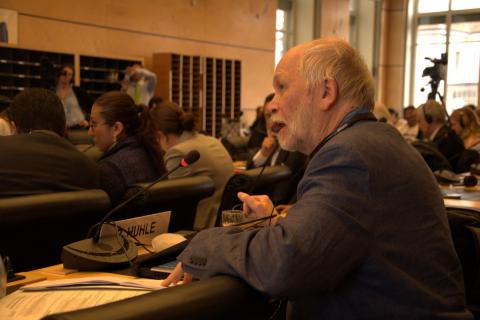
In September 2015, after the first review of Iraq, the United Nations Committee on Enforced Disappearances (CED) issued three priority recommendations that the country should implement within one year to ensure compliance with the UN Convention on Enforced Disappearances (ICCPED). Iraq had to address the lack of legislation prohibiting and criminalising enforced disappearance and the practice of secret detention, and fulfil its obligation to search for the disappeared. As the group of UN experts is due to review the implementation of these recommendations during its 13th session, Alkarama submitted to the UN experts its follow-up report, which highlights that these priority issues have not been addressed in the past two years.
Iraqi law has still not been amended to define and criminalise enforced disappearances as an autonomous offence as required by the ICCPED. Moreover, the Penal Code does not provide for appropriate penalties nor covers acts committed by groups acting with the authorisation, support or acquiescence of the State. This is particularly concerning considering that a high number of enforced disappearances are being carried out by militias affiliated to the People Mobilisation Units (PMU), an umbrella organisation comprised of 67 prevalently Shia militias embedded in the Iraqi army.
Moreover, in the past two years, secret detention remained largely practiced in the country, including by PMU-affiliated militias. While they do not have any legal power to arrest and detain, the PMU have been detaining in secret and incommunicado – without any access to the outside world – activists as well as civilians fleeing areas under the Islamic State control or combat zones.
As for the obligation to search for the disappeared, in its follow-up report, the Iraqi authorities argued that different institutions are mandated to inquire on the fate and the whereabouts of the missing. However, Alkarama expressed concern over the fact that these mechanisms are ineffective, as relatives of disappeared persons were systematically mocked and insulted, if not told to go to another office. In some cases, relatives inquiring about the fate and whereabouts of missing family members were abducted as an act of retaliation. Considering the ineffectiveness and the risks deriving from reporting disappearances to the national authorities, numerous families raised their relative’s case with Alkarama in order to file complaints with the CED. However, the Iraqi authorities have not clarified the victims’ fate and whereabouts, showing little willingness to investigate enforced disappearances.
Alkarama will continue to monitor the implementation of the CED recommendations within the next year as Iraq is expected to submit its second periodic report to the Committee on 18 September 2018.
For more information or an interview, please contact media@alkarama.org (Dir: +41 22 734 1008).
